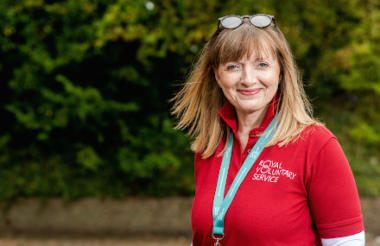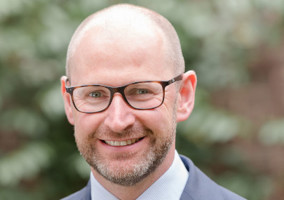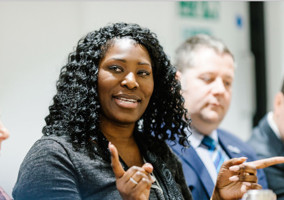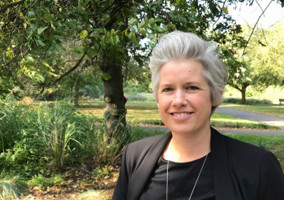Catherine Johnstone describes herself as being “built for crises”, which is a good attitude for the person at the helm of Royal Voluntary Service (RVS) to have, especially as the charity was asked to run a national volunteer scheme at the height of the coronavirus pandemic.
She credits her experience running NHS accident and emergency units for giving her the skills to handle a crisis.
Having left the NHS “reluctantly” to look after her five young children, she set up her own training company for care staff and then moved into the charity sector. Before joining RVS in 2017 she was chief executive at the Samaritans for seven years, where she was involved in setting up the National Suicide Prevention Alliance.
“I quite like a crisis. I was built for crises. I've always run frontline service organisations, so I like the front line,” she says.
“There's lots more opportunities in a crisis, there's lots more diversity and opportunity, and people are more motivated to step forward because of the crisis,” she adds.
Nonetheless, she admits: “If I said I haven't been overwhelmed at times, I'd be lying.
“But when you are in a crisis, and when you are leading, not only do you have to have huge degrees of humility, and resilience and energy, you also have to have a level of confidence. Because if all eyes are on you because it's a crisis, and people need to be led, they don't need to see the leader with his or her head in their hands going, ‘Oh, my God, it's dreadful, isn't it?'”
RVS mobilises volunteers to support ‘pithy, challenging, issues’
When she arrived at RVS in 2017, Johnstone “felt that there was an opportunity to take it to the next level”.
RVS has been mobilising volunteers to support “pithy, challenging issues” in society since its inception, but Johnstone felt it become “a bit hidden over the last decade”.
The charity had been doing a lot of work with the ageing population, and therefore people had seen RVS “become more synonymous with older people, rather than mobilising volunteers to support older people”.
While RVS is still supported by many older people, it has adapted their focus and messaging.
“The last three years, we've spent talking about the importance of volunteering and looking at all sorts of different ways of volunteering,” she explains. “We needed to put inspiring the gift of voluntary action, back at the forefront of the messages from RVS and right at the heart of the work that we were doing.”
‘When the chips are down, people in communities will step forward’
Earlier this year when there was a surge in volunteers coming forward to help early in the the pandemic, Johnstone says she wasn't surprised.
“When the chips are down, people in communities will step forward. So, we will all take on accountability and also, we will create space to be able to take on that accountability,” she says.
In March, RVS was commissioned to deliver the NHS Volunteer Responders scheme, which was set up as part of the pandemic response to provide a safety net to protect patients, the NHS and complement existing local volunteer provision.
RVS and St John Ambulance had been to the government, and offered assistance. And “from there was born NHS volunteer responders”.
'There's no lack of supply of volunteers'
Johnstone says RVS “is built to mobilise in a crisis” and thinks that overall the sector did a good job. However, how well communities mobilised was based from their pre-Covid starting point, so results were varied.
She explains “some were able to mobilise in a more coordinated way, and get up and running much more quickly than if you were in an area, of which there are many, where infrastructure has been decimated”.
For Johnstone the crisis has demonstrated “there's no lack of supply of volunteers” but the coordination, the support, the training, the deployment, and then the ongoing communications “needs to be right in order to sustain a resilient response”.
“One of the biggest challenges, and still is one of the biggest challenges, is how do you create systems and structures culturally, that see the explicit value [of volunteering]” given that “even if if every single person in the country gave an hour away, we'd still only be scratching the surface.”
Johnstone notes “there was a big noise at the beginning about potential under utilisation of volunteers”.
She says: “People didn't understand that we needed a lot of volunteers in order for us to get great coverage in every community in England” but “that went away quite quickly because the scheme wasn't about a volunteer utilisation scheme. It was about a resilient scheme that had enough volunteers to be able to respond to the increasing need in communities.”
Strategy: ‘We needed to respond to the crisis’
Given the pandemic, many charities have been forced to rethink their ambitions, and RVS is no exception.
Johnstone’s initial 2018-23 strategy was based on the vision that Britain would become a healthier and happier place as a result of volunteering, “so that vision hasn't changed”.
RVS's mission is to mobilise volunteers to meet the most pressing and urgent needs of the day, “so that is not going to change anytime soon”.
“So our vision and mission stay absolutely solid,” Johnstone says.
Nonetheless, given Covid-19 she has reviewed the strategic plan to the end of 2023. This will be about making sure RVS has got the right resilience, is looking after its volunteers and staff, and that it is planning for the future appropriately.
“We are going to be talking more about the NHS and integrated care support and how we help them deal with the exacerbation of health inequalities, Covid recoveries and impact, and building resilient communities,” she says.
Johnstone adds that RVS will also “share our learning more overtly” to help others to mobilise volunteers.
'We need to be easy to access'
Another part of the RVS strategy is to “focus our resources where the need is greatest but also we need to focus our volunteering opportunities in those communities and enable community leaders and people in those communities to volunteer”.
She wants the sector to “stop talking about hard to reach communities” and says it is not about “doing unto people”.
She says: “I think Black Lives Matter is a catalyst, we all have to get to a point where we are easy to access services” and “truly make it inclusive”.
“My organisation increasingly looks through an inclusion lens, and if you go through this lens then you are not allowed to go far wrong,” she says.
“I feel duty that we help people to volunteer and find people to find their place,” she adds. “They will be better for it and our society will be, it is never more needed. Everybody needs to give their time.”
Income: ‘We must not go below this reserves level - and we are not far away’
Like much of the sector RVS is facing financial pressures, and its reserves are “not far away from” the minimum level it needs to be resilient, Johnstone says.
Raising money can be a challenge partially because “we do not have that brand recognition” that some other large charities have, Johnstone adds.
A large part of RVS’s income is from its retail activities, which were badly hit by measures introduced to deal with the pandemic.
“We are one of the largest retailers in the NHS. So we have got coffee shops, cafes, pop ups, trolleys, and whilst we did not close the portfolio completely it was down to a needs only essential service,” Johnstone explains.
This pause “wiped out most of what would be a £43m income a year”.
She says the charity utilised the furlough scheme quite efficiently “I think and it has been a real life saver”.
Now RVS has reopened about half of its retail portfolio, “every week we are opening more, but obviously the levels of income are still less than optimum because of footfall and everything else”, says Johnstone.
She estimates it will be at least two years to get back to pre-Covid levels of income, if ever.
Unlike SJA, RVS did not receive any emergency funding through the Department of Health and Social Care.“I am disappointed but I do not have time to worry about it, it's what we do next,” she adds.
RVS has launched a fundraising appeal and Johnstone says funders have been “stunning”.
“I cannot at any point get complacent, I cannot stop asking for support because we need it,” she adds.
‘There is not enough money anywhere’
On the wider government response, Johnstone notes “there has been plenty of conversation around the sector being decimated” but says: “Of course it is. So is business, to a degree so is government, so is the NHS. There is not enough money anywhere.”
She thinks the conversation should be around the investment needed, “it needs to be about how we make the best investments rather than whether we need more money in reserves”.
“Why did a lot of the sector think that the government would have lots of time to be sorting out how much money it is going to give, to what is a very disparate, very diverse and wide ranging sector? Actually it was trying to work out the government response, and the economic response.
“I think we are right to want to be part of the economic response but I do not think that was ever going to happen immediately. They allocated what I was expecting them to allocate. What we were asking for was a reflection of the fact we could do some really great things with that money if it had come,” she says.
The sector must be coordinated moving forward, Johnstone suggests.
“The voluntary sector is really good at mobilising and being complementary to the state and plugging the gaps and delivering front line services”, she says, but “some people are going to have to seed funding or territory” and “those who do not collaborate will not survive”.
Kruger report should be a 'catalyst' for charities
This summer the Conservative MP Danny Kruger was tasked with compiling a report for the government about the charity sector's role in the next phase of the pandemic response.
RVS invested a lot of time into its response, again working closely with St John Ambulance. Johnstone says this collaboration between RVS and SJA has been critical.
“You learn in a crisis, you have to trust your fellow man and your fellow leaders. And there's been small groups of us that have sort of lent on each other, both national leaders and local leaders, where particularly those of us who have been delivering very dynamically on the front line, we've gravitated together, and we've relied hugely on each other, hugely,” she says.
On speaking to Kruger, Johnstone explains: “What we said was we appreciate you doing this work. We would ask that you think about both creating an environment where national and local are mutually inclusive, and that whatever comes out of your report, it does not create another load of silos.”
She added: “From a volunteering perspective we made strong recommendations about the necessity for creating a world where people give their time consistently and effectively.”
Johnstone questions “why is it that we create all these barriers” to get into volunteering, so she was pleased to see the volunteer passport recommendations.
“I think [the report] is insightful and I think he has played a blinder, in that he has not written a government report about the sector. He has written a report about society,” she says.
She agrees with the sentiment that “government can write great policy but their ability to enact it is rubbish” while “the sector often does not write great government policy but our ability to enact and mobilise government policy because we are trusted partners and in communities is usually second to none”.
Johnstone “did not expect to like the report” because a lot of the time reviews that are done in a hurry, top down, do not get “underneath the skin of it all”.
“I was cynical but I have been really surprised and excited by what he has written”, she says, and expects that the report will move forward as “the necessity is there at the moment”.
The sector should “use it as a catalyst” to show the urgency of needing voluntary action to be supported.
Related articles












